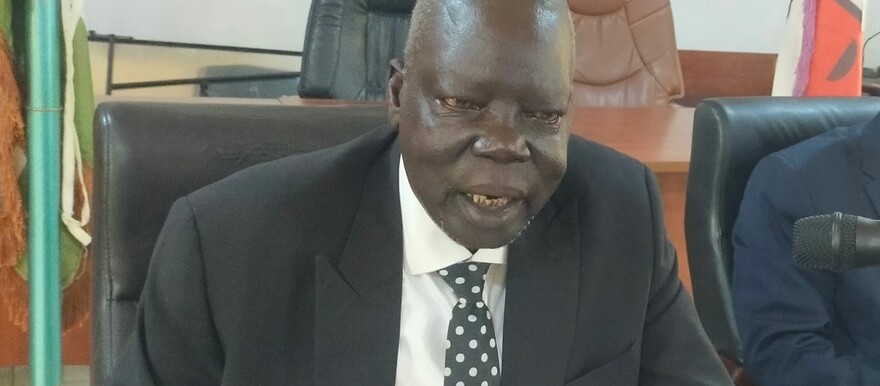The National Minister of Justice and Constitutional Affairs Reuben Madol Arol has called for a resolution of the issue of languages used in South Sudan’s courts.
Since the independence of South Sudan, the country has adopted English as the official language in the country but the judiciary continues to use Arabic as a mode of communication.
Speaking during a Judicial Reform Committee Consultation on the views of the Justice Minister on the judiciary on Saturday, Minister Madol said the issue of language should be resolved sooner rather than later!
“We are trying to reform the judiciary now. If we are to succeed then this is an issue that must be resolved and the sooner the better. The issue of the language, the issue of how to shift from the hybrid nature of the legal training that we have in the country and have one Jurisprudence,” Justice Madol said. “If we have chosen the Common Law system then we have to orient those who have never been trained in the Common Law jurisprudence to at least master some fundamentals of jurisprudence and therefore the language.”
He stressed that South Sudan had the privilege of having a legal system based on the Common Law jurisprudence adding that even during the time of changes in the legal system in Sudan, South Sudan chose to cling to the common law heritage of the legal system and this heritage is in the form of jurisprudence that was developed based on legislation that was influenced by the common law and adopted in South Sudan.
“This was the Jurisprudence that was taught in the Universities of Khartoum and it was taught in English as a language but there came a time when the legal system in the whole of Sudan changed to Arabic and the content became theocratic in terms of sharia training of lawyers there and this continues to affect the sort of training that most South Sudanese lawyers have had now,” Madol reiterated.
He said several things remain thorny to judicial reforms in South Sudan and cited the independence of the judiciary as a pillar of the government.
“Independence of the judiciary in the sense that there should be no interference with the professional work of courts and therefore decisions of judges is still a big challenge. It is a big challenge because, at certain stages of the development of the judiciary as an institution, judicial powers had been exercised not just by the judges but even by non-judges, those who are not trained in law,” Madol said.
“The idea that judiciary is an independent pillar of government whose role is to adjudicate and make decisions that have to be executed by other organs of the state is still a challenge because the way judiciary decisions orders are perceived and to be implemented still is not quite very clear to most people, even some of the institutions. Interference in the professional work of judges affects the independence of the courts and the judges.”
The Justice Minister stressed that in the context of independence of the judiciary, resources that are required for the judiciary to function by law have to come from a consolidated account and the judiciary has to have the independence to manage these resources in as much and for as long as it is accountable to the public on how these resources are managed.
For his part, James Ogola, a retired judge from Uganda who is the Chairperson of the Judicial Reform Committee, said they have been working over the last 20 months to see to it that South Sudan`s judiciary is efficient and delivers justice to the South Sudanese people.
He said they have completed their consultation work and will soon hold a symposium that will bring together all South Sudanese from all walks of life to present their findings.
“We want an efficient judiciary, an effective judiciary, a professional judiciary, a competent judiciary, one that delivers access to justice for its court users. A judiciary that is independent, impartial, and delivers its work without fear from anybody of favor to anybody, a judiciary that has properly established systems that have appropriate tools for its job, legal books, literature, equipment, IT, and infrastructure. A judiciary that answers the needs of the population, a judiciary that in other words equals to the challenges of a post-conflict South Sudan, a judiciary that renders a rule of law not the rule of war,” Ogola said.
“We are planning to have a validation conference symposium to call on very many, the population of South Sudan about 100 people, professionals, politicians, lawyers, judges, policymakers, women youths we want the entire population of this country then we present our recommendations give them a chance to think through and a chance to give us their feedback so that we can finalize this job and present it to the government of this country.”




